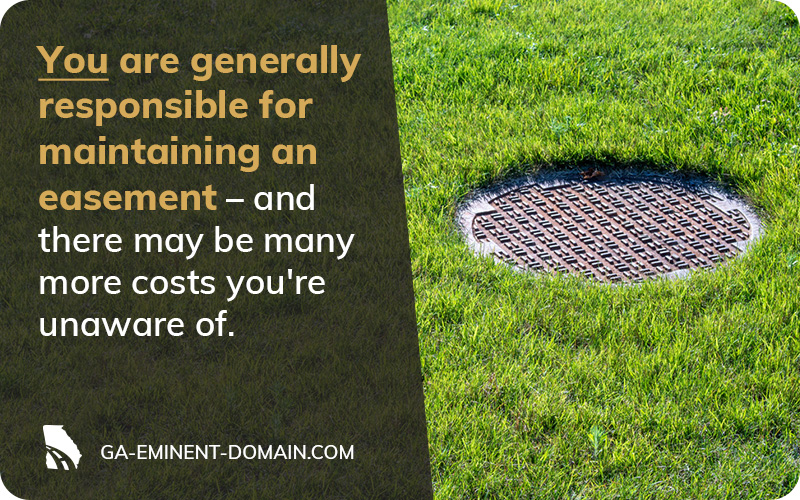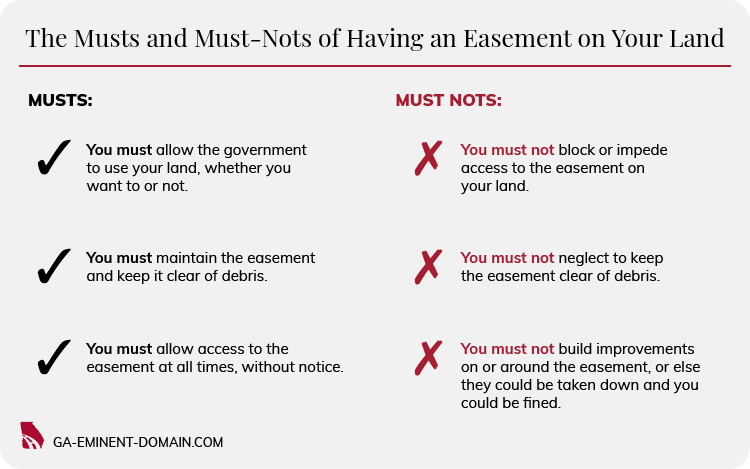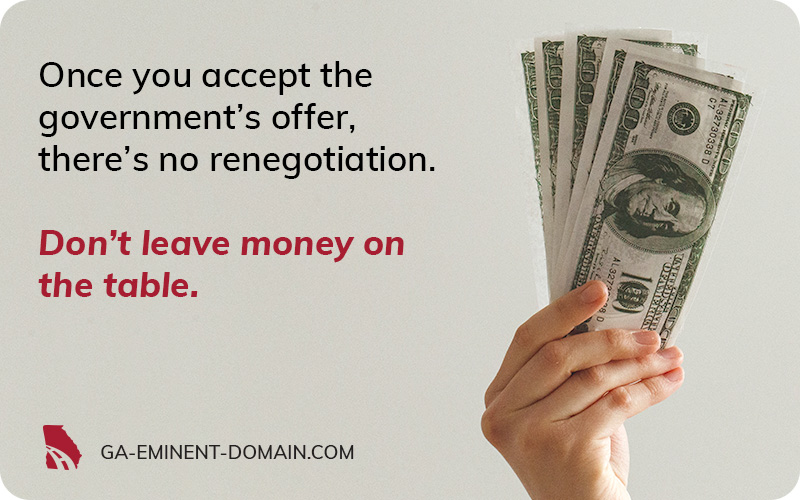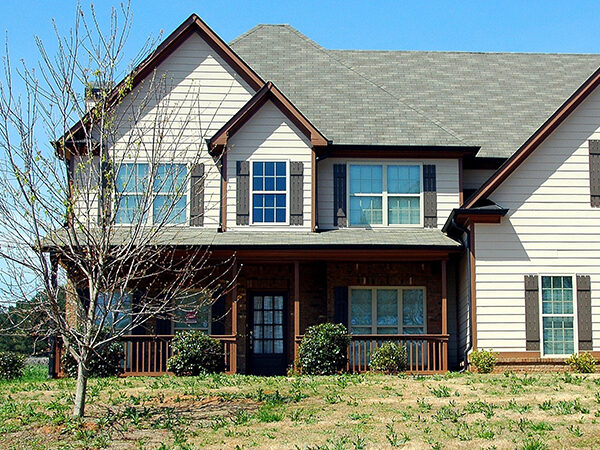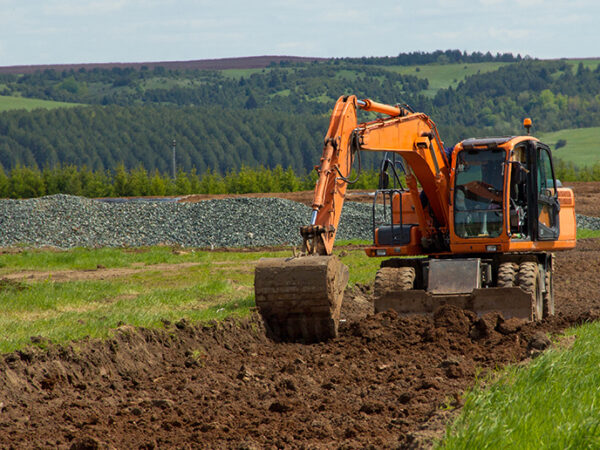When the government decides to use your land for an easement, some people assume it’s no big deal. In reality, an easement can have drastic and costly consequences for your land in both the short and long term.
The fact that you are generally responsible for maintaining the government’s easement with your own time and resources is just one reason you should be very wary when the government decides to take an easement on your land.
In this article, I’ll explain the general maintenance rules, the surprise and severe damages many people experience from easements, and how an attorney can help you fight for maximum compensation from the government for the easement they want on your land.
Easement maintenance responsibilities – What do I have to do?
Whichever type of easement the government takes, you must generally keep it clear of debris and allow the government to access it whenever they want. Your additional easement maintenance responsibilities depend on the type of easement:
Sewer and drainage easements
These are intended to help control the flow of water to prevent floods and other potentially damaging water-related problems. Maintenance duties often include mowing the area and keeping it free of debris, trash, and pollutants.
Utility easements
These include land used for power, gas, and other utilities. Examples include power lines and buried gas pipes. Maintenance duties often include keeping the area accessible for government workers and not digging anywhere nearby.
Construction easements
These allow the government to use your land “temporarily” while they’re completing a nearby construction project. Maintenance duties often include keeping the area clear so construction crews can use it to stage tools and equipment for the project.
One of your primary maintenance responsibilities is to ensure the easement holder can access it at any time without impediment. This generally means no typical land features in the easement area, like no fences or trees. If your fence, garden, or other land features are destroyed by the government when they need to access the easement, you are likely not owed any compensation – even if you thought your garden was out of the way enough.
We once had a client who thought they were in compliance with their easement agreement when they put in a garden surrounded by a short wooden fence in the vicinity of the easement. They took extra care to try to ensure that it wouldn’t be in the way of government workers accessing the land, but then came home one day to discover the fence smashed and the garden trampled. No matter what the government tells you, easements are often much more than a slight inconvenience.
What if I don’t maintain the easement on my land? Are there penalties?
Unfortunately, if you don’t maintain the easement, or if you make improvements that restrict access to it, you may face penalties. This comes up most often in cases in where a property owner installs a fence, structure, sign, or other improvement in or near the easement area.
In those cases, the government generally sends a notice of removal. If the improvement is not removed, the government will remove it and invoice the property owner. They may also invoice the owner if they need to mow the area or otherwise clear it of debris. Thus, failing to maintain an easement can be expensive and won’t prevent the government from using it anyway.
Can the government expand or change their use of the easement?
You may assume that the government will stop at just one easement, or that the easement will always be limited in scope to its original intent. Unfortunately, the reality is that one easement often creates the need for another, such as a construction easement that leads to the need for a slope easement, or a utility easement that requires a drainage easement to prevent flooding. The government may also decide to change a temporary easement into a permanent one!
What if I don’t want an easement on my land – Can I fight it?
We understand that it’s probably very frustrating to know that the government can use your land whether you want them to or not. Unfortunately, the reality is that it’s highly unlikely that you’ll be able to successfully resist an easement on your property.
This is why it’s so important to fight for the full value of the easement on your land when the government first takes it.
Don’t accept the government’s first offer. Contact an experienced eminent domain attorney at 1-888-391-1339 for a free professional opinion on your case. Get clarity with no obligation.
The hidden costs of the government’s easement
It’s important to understand that once the government has an easement on your property, they generally can do what they like with it while you have to maintain it for them at your own expense.
Always remember how destructive these “simple” easements can be. In addition to restricting your use, some of the potential unexpected impacts of an easement include:
- The Financial Toll – Easements can make a property harder to sell. That means easements can lower your property’s worth and undermine its value as an investment asset over time. Plus, you’ll likely have to put your own money into maintenance, such as by buying a mower and supplying gasoline.
- Lost Time and Travel – Of course, it takes time to perform maintenance. And what about the travel time? If it’s a secondary residence for you or out-of-the-way, you still may have to take regular trips out to maintain it.
Easement impacts on business owners
Easements can be especially devastating for business owners because many depend on the way their land is situated for things like parking, code compliance, and other important issues. An easement can take away space that’s vital to the function of the business, and yet the compensation you can receive will most likely be limited to the value of the land itself, not your lost revenue.
Many business owners live some distance from their place of work, meaning that if an easement is placed on the land your company owns, you’ll likely have to travel there more often to maintain it.
We once had a client business owner who, due to the nature of their industry, lived a significant distance from their place of business. When the government put an easement on their company property, that meant they had to make the long commute to and from work a few extra times a month, just to perform maintenance on the easement.
How to fight for more easement compensation
When the government wants an easement on your land, they’ll make you an initial offer. This offer is almost certainly too low and should be rejected. Even if they argue that they’re only taking a small part of your land, you now have an idea of the drastic consequences an easement can cause for you or your business on an ongoing, escalating basis.
An easement is an unwanted, often permanent relationship between you and the government. Rejecting their initial offer and fighting for more is likely your one and only chance to seek compensation for all the possible costs and consequences of the easement.
Once you accept the government’s offer, there’s no renegotiation. Don’t leave money on the table.
We once had a client who was subjected to an easement on their family’s land. The government seemed friendly, but then made an obviously lowball offer. The client initially tried pushing back on their own, but after months of delays, finally reached out to us. We were able to bring the government to the negotiating table more quickly and secure a much fairer offer.1
Free Case Evaluation – Georgia Eminent Domain Law Firm
Do you know or suspect the government (or a private utility) wants an easement on your land? Act now!
Call us for a free professional opinion with no obligation. If we think we can help you and you choose to hire us, it doesn’t cost any extra to have us start protecting your rights immediately. You pay nothing up front and we don’t charge by the hour.
We can start building your case immediately, including leveraging our extensive network of experts – land planners, surveyors, engineers, and more – as needed. We advance all these costs. And you pay no attorney’s fee at all if we don’t increase the government’s offer to you. Guaranteed.2
Four of our attorneys have experience working for a state Department of Transportation. We use that other-side knowledge to help our clients fight for maximum compensation. This can be very important in an easement case because future potential impacts are so difficult to project.
Since we’ve been in business, we’ve tripled our clients’ initial offers, on average.1
Contact us today online or at 1-888-391-1339 for a free case evaluation if your land is being threatened by an easement. See why our clients get 3x their initial property offers!1
FREQUENTLY ASKED QUESTIONS
Is eminent domain the same as an easement?
Eminent domain can result in the government taking ownership of your land or just using your land. An easement, as opposed to a taking, means you still own the land while the government gets to use it. The consequences for the landowner can be just as dire for an easement as for a full taking.
Who is responsible for maintaining an easement in Georgia?
According to Georgia state law, the property owner is generally responsible for maintaining the easement such as by not allowing debris or trash to accumulate in the easement area.
What are the requirements for an easement in Georgia?
For the government to take your land to use for an easement, they must provide you with “just compensation.” The problem is that how much this amounts to can be a matter of dispute. Property owners and their attorneys must often fight for maximum compensation.
Can I refuse a utility easement?
Fighting a utility easement (or any kind of easement) is unlikely to be successful. We recommend that you focus on fighting for the full value of your property from the government instead. This negotiation process is likely your one and only chance to fight for compensation for all the harms and consequences you may suffer long term from the easement on your land.
You May Also Be Interested In
Can a Property Owner Block an Easement?
Why Hire an Eminent Domain Attorney?
What Is My Eminent Domain Case Worth?
Easements: Taking Your Rights Without Taking Your Property
Loss of Income: How Georgia Eminent Domain Law Can Help Business Owners
